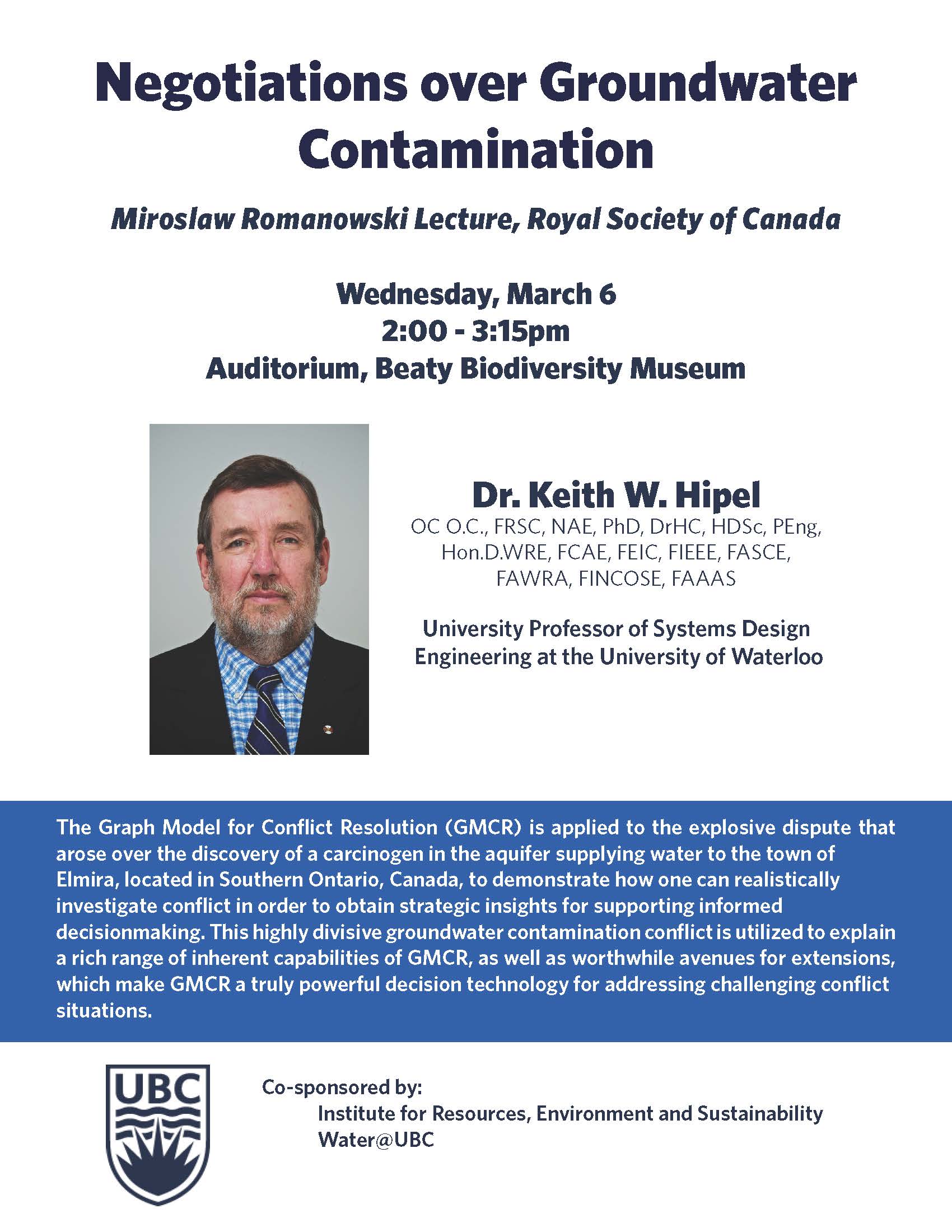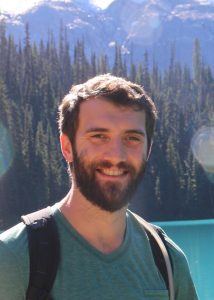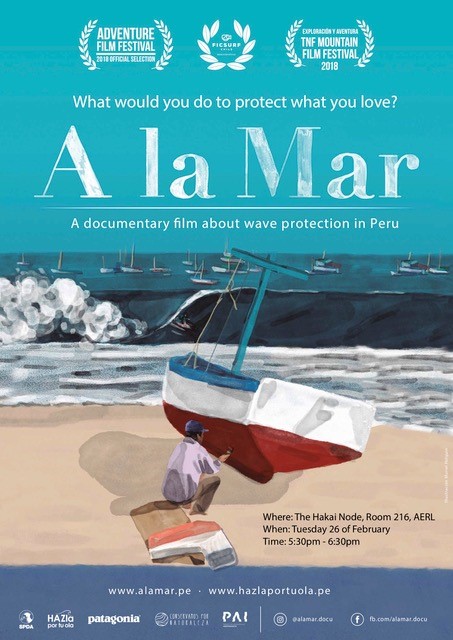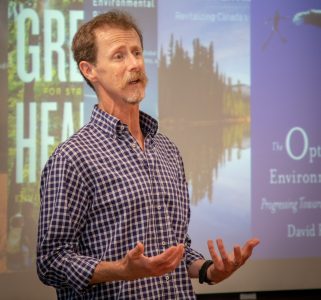
Learn more about Negotiations over Groundwater Contamination in a special Royal Society of Canada lecture with Dr. Keith W. Hipel, University Professor of Systems Design Engineering at the University of Waterloo.

Learn more about Negotiations over Groundwater Contamination in a special Royal Society of Canada lecture with Dr. Keith W. Hipel, University Professor of Systems Design Engineering at the University of Waterloo.

Congratulation to IRES’ very own Helina Jolly for receiving the prestigious National Geographic Young Explorers award! This award is in support of Helina’s proposed project, “De-mystifying the Adivasi knowledge of forest and wildlife in India,” which will be used to help her conduct her field study on the Kattunayakar communities of the Western Ghats and their relationship with forest ecosystem services.
IRES Seminar Series
Time: 12:30pm to 1:30pm (every Thursday)
Location: AERL Theatre (room 120), 2202 Main Mall
*********************************************************************************
*** CLICK HERE TO VIEW RECORDING (Sahir 5:31-30:30) (Sean 31:00-55:00)***

IRES & IOF PhD Candidate
Bio:
I am a PhD Candidate at IRES and the Institute for the Oceans and Fisheries (IOF), University of British Columbia. I’m interested in determining sustainable solutions for small-scale fisheries through interdisciplinary research. My PhD research intends to understand how cultural differences, settlement history and involvement in fishing 1) affect the values that communities ascribe to marine resources, 2) influence resource sustainability, and 3) impact vulnerability of social-ecological systems to globalization and commoditization. I have worked with fishing communities in the Andaman and Nicobar Islands since 2012 while working with Dakshin Foundation, where I am a Junior Adjunct Research Fellow. This research was funded through a UBC Four-Year Fellowship, an International Development Research Centre (IDRC) Doctoral Fellowship, the Cecil and Kathleen Morrow Scholarship, and the Robin Rigby Trust.
Abstract:
Effective fisheries policies should incorporate the diversity of socio-cultural values of fishery stakeholders. This involves designing tools that identify diverse local needs and contexts and translating them into accessible formats. In this talk I will describe the creation of a set of 12 value cards to depict values associated with fishing in the Andaman and Nicobar Islands, India, using cross-cultural and locally-contextualised value phrases together with locally produced artwork. I will then describe communities’ value priorities, that were understood through ranking exercises amongst 101 respondents from four cultural groups, spanning various roles in the fishery value chain. I conclude with a discussion of how understanding the values of fishery stakeholders can lead to effective and equitable fisheries policy and management.
********************************************************************

IRES MSc Student
Bio:
Sean is pursuing a MSc with Hadi Dowlatabadi. He is a professional engineer with a mechanical engineering degree from the University of Alberta. After graduating, he worked in the pipeline industry in both technical and project management roles. Working in this industry during the various pipeline controversies fostered his interest in the relationship between our energy system and the environment. Sean strives to take an interdisciplinary approach to energy and environmental issues, engaging in practical, objective, and technically-informed energy policy analysis.
Abstract:
Natural gas transmission accounts for 1% to 2% of all CO2 emissions in Canada. To significantly improve the efficiency of this system, electricity can be generated from otherwise wasted heat energy. This electricity has an incremental emissions factor similar to wind and solar generation. The technical potential of this resource is approximately 1.2 GW, slightly larger than the Site C dam and over 10% of the Canadian coal capacity to be phased out by 2030. However, despite pilot installations in the 1990s and late 2000s, waste heat to power installations have not achieved significant market penetration. This study aims to reassess the technical, economic, and regulatory limitations of this option in light of improved technologies, market dynamics, energy prices and climate policies.

Photo Credit: Madison Stevens, IRES PhD Student

Join us for a screening of A la Mar, a Peruvian documentary film. Following the film, we will have a facilitated discussion and Q&A with a few experts and a short reception.
About the film:
In the eighties, La Herradura beach in Peru was destroyed. In the nineties, the wave of Cabo Blanco was in danger of disappearing so a group of surfers got together to protect these places and got the State to approve the Law of Rompientes in the year 2000, the first law in the world for the protection of the waves.
This is the story that the documentary A La Mar narrates. Produced by Conservamos por Naturaleza, and presented by Patagonia, it was released yesterday in the French Alliance in Miraflores, Lima.
Watch the trailer: https://www.livinginperu.com/a-la-mar-documentary-about-wave-protection-in-peru/

David Boyd is an Associate Professor of Law, Policy and Sustainability, as well as a Special Rapporteur on Human Rights and Environment for the United Nations. His first report to the UN Human Rights Council is now public and available in the six official UN languages here.
Summary
In the present report, the Special Rapporteur recalls that the right to a healthy environment has been recognized by a majority of States in their constitutions, legislation, and various regional treaties to which they are parties. However, in spite of the wide recognition of its crucial importance, the right to a healthy environment has not yet been recognized as such at the global level. The Special Rapporteur focuses on the right to breathe clean air as one of its component and describes the negative impact of air pollution on the enjoyment of many human rights, in particular the right to life and the right to health, in particular by vulnerable groups. He highlights the different State obligations in relation to the right to breathe clean air, which are both procedural and substantive, as well as the specific obligation to protect people and groups in vulnerable situations. He identifies several good practices implemented worldwide that have helped to improve air quality. Finally, the Special Rapporteur offers a number of recommendations to States for actions they should consider as part of a national air quality action plan and urges businesses, in order to fulfil their responsibility in this regard, to contribute to and support efforts to reduce air pollution.